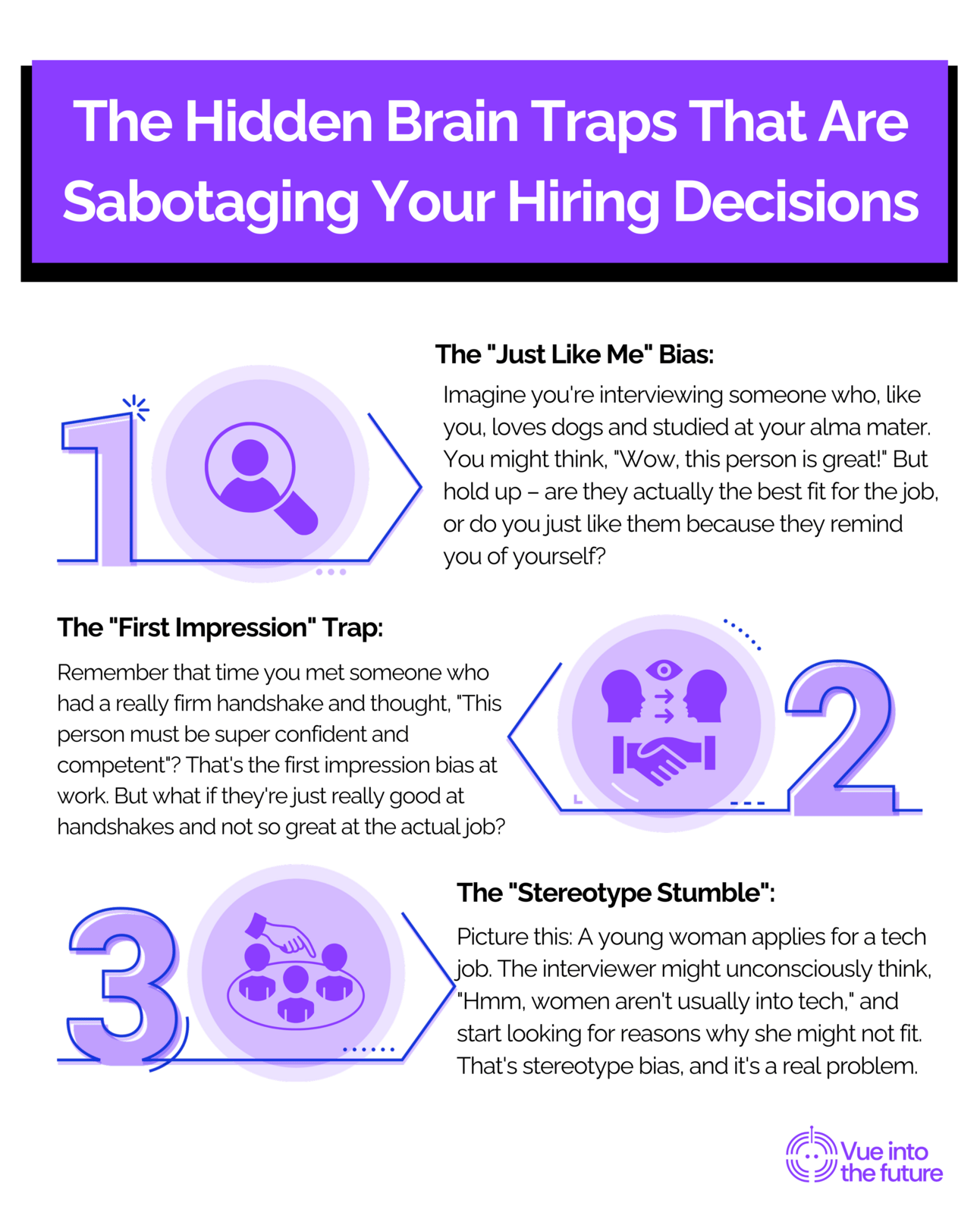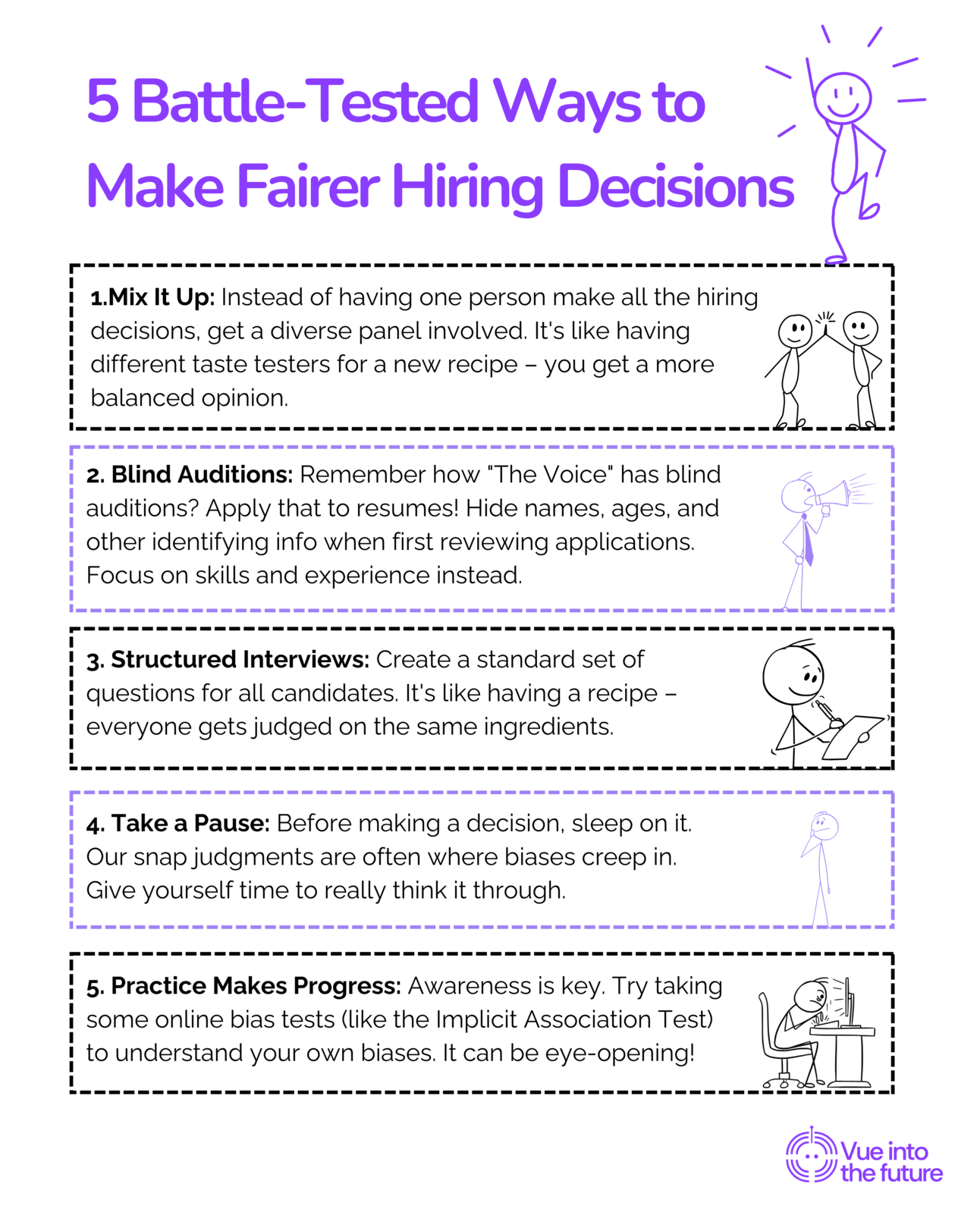- Vue Into The Future by Openintervue
- Posts
- Oops, Your Brain Is Sabotaging Your Hiring!
Oops, Your Brain Is Sabotaging Your Hiring!
Unmasking the Sneaky Biases That Cost You Top Talent (And How AI Can Save the Day)
Hey there!
Ever wondered why some super-talented people you know struggle to land jobs, while others seem to breeze through interviews?
Well, a big part of it might be down to something called cognitive biases in hiring. Don't worry if that sounds a bit fancy – we're going to break it all down in simple terms.
So, grab a coffee (or your beverage of choice), and let's dive into this important topic!
What Are These Biases Anyway?
Okay, so cognitive biases are basically like mental shortcuts our brains take. They're not always bad – they help us make quick decisions in everyday life. But when it comes to hiring, these shortcuts can lead us astray. Let's look at a few examples:

How These Biases Mess Things Up
Now, you might be thinking, "Okay, but how bad can these biases really be?" Well, let me tell you – they can cause quite a stir for both job seekers and companies.
For Job Seekers:
Imagine you're Ayesha, a brilliant coder with purple hair. You've aced every coding challenge thrown your way, but you keep getting rejected after interviews. Why? Some interviewers might be unconsciously biased against non-traditional appearances. It's frustrating, unfair, and can really knock your confidence.
Or think about Manas, who has a slight accent. He's incredibly qualified but keeps losing out to less experienced candidates who "communicate better" – according to biased interviewers who equate accents with communication skills.
For Companies:
Now, let's flip to the company side. Meet TechCo(name changed), a startup that keeps hiring people who are "culture fits" – which basically means they're hiring carbon copies of the founders. Six months down the line, they're scratching their heads wondering why they're not coming up with innovative ideas. Well, when everyone thinks the same way, you miss out on diverse perspectives that drive innovation!
Or consider BigCorp, which has a bias towards hiring from certain prestigious universities. They're missing out on hungry, talented individuals from other backgrounds who could bring fresh energy to the team.
So, What Can We Do About It?
Alright, enough doom and gloom – let's talk solutions! Here are some practical ways companies (and even you, in your own life) can fight these sneaky biases:

A New Player in the Game
Now, here's where things get really interesting. Artificial Intelligence is stepping into the hiring world, and it's shaking things up in a good way. At OpenIntervue, we've developed something called PIHU (AI -Conversational Recruiter). Think of it as your friendly neighborhood AI assistant for fairer hiring.
Here's how PIHU lends a hand:
Resume Screening Without the Bias: PIHU looks at resumes focusing on skills and experience, not on names or where someone went to school. It's like having a super-efficient assistant who doesn't care if your name is John or Jamal.
Custom Questions: Based on the job and the candidate's background, PIHU suggests interview questions. This ensures everyone gets a fair shot at showcasing their skills.
Bias Alert: During interviews, PIHU can give a gentle nudge if it spots potential bias creeping in. It's like having a friend whisper, "Hey, you might want to rethink that" when you're about to say something iffy.
Skill Check: PIHU helps set up fair tests of candidates' abilities, ensuring everyone gets an equal chance to shine.
Data-Driven Decisions: After all is said and done, PIHU provides a summary of each candidate based on objective criteria. It's like getting a balanced report card for each applicant.
Real-Life Success Stories
Let's look at how tackling bias can make a real difference:
Tech Startup Turnaround: A small tech company was struggling with homogeneous thinking. They implemented blind resume screenings and diverse interview panels. Result? They hired a mix of fresh graduates and experienced professionals from various backgrounds. Six months later, they launched their most innovative product yet!
Ayesha's Second Chance: Remember Ayesha (name changed for privacy) with the purple hair? A company using AI-assisted screening focused on her coding skills rather than appearance. She got the job and is now leading a key project.
BigCorp's (name changed) Big Change: After realizing they were missing out on talent, BigCorp broadened their hiring sources. They found a star employee from a community college who brought a unique perspective to solving customer problems.
To become the next SUCCESS STORY, try our DEMO: https://openintervue.com/demo
Wrapping It Up: Why This Matters
Listen, at the end of the day, this isn't just about making hiring "fair" – it's about making it better for everyone. When companies hire based on true talent and potential rather than unconscious biases:
Job seekers get a fair shot at showcasing their skills
Companies build stronger, more innovative teams
We all benefit from diverse perspectives in the workplace
It's a win-win-win situation!
What You Can Do
Whether you're a job seeker, a hiring manager, or just someone interested in fairness, here are a few takeaways:
Stay Aware: Recognize that we all have biases. It's human nature, but being aware is the first step to overcoming them.
Speak Up: If you notice biased practices in your workplace, don't be afraid to suggest improvements.
Keep Learning: Stay informed about new tools and techniques for fair hiring. The field is always evolving!
Give AI a Chance: If your company is considering AI tools like PIHU, be open to them. They're not perfect, but they can be a great step towards fairer hiring.
Remember, creating a fair hiring process isn't just good ethics – it's good business.
By tapping into a wider pool of talent and perspectives, we're setting ourselves up for a more innovative, productive, and harmonious work world.
So, next time you're involved in hiring (or being hired), keep these ideas in mind.
Let's work together to build workplaces where everyone gets a fair shot at success.
After all, the next game-changing idea could come from anyone – let's make sure we're not missing out because of a few sneaky biases!
Until next time,